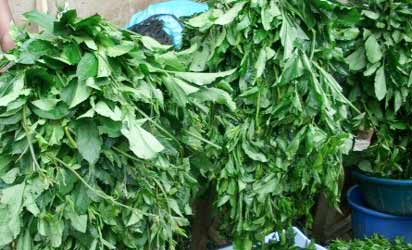The importance of the African indigenous varieties of leafy vegetables has been emphasised over time as well as their medicinal abilities. In Nigeria, edible vegetable leaves such as water leaf fluted pumpkin, bitter leaf, Moringa oleifera, mint leaf, lemon grass are not only accessible and cheap but are good sources of natural healing which is overlooked by many. These indigenous vegetables are commonly consumed but underrated despite their medicinal properties and ability to act as a natural source of therapeutic agents.
Below are some common vegetables with medicinal components:
Water leaf (Talinum triangulare)
Talinum triangulare belongs to the family of portulacaceae and is a short-lived perennial succulent shrub sensitive to cold conditions. It can grow wild on its own without cultivation and is known for its flavour, softness and taste. It is rich in fibre, protein and has various vitamins necessary for human healthy diet, a good source of some important minerals such as magnesium and potassium; as well as antioxidant vitamins. It has proven to have a very strong amount of antioxidant, antimicrobial and anti-inflammatory properties with potentials for management of metabolic syndrome including diabetes, high cholesterol and hypertension
Fluted pumpkin (Telfairia occidentalis)
Known locally as eweroko in Yoruba), ikong-ubong in Efik/Ibibio), ugwu in Igbo and offi in Ukwani, this perennial plant in the family of cucurbitaceae is widely cultivated for its nutritious and palatable leaves; and it is commonly grown as outdoor domestic food plant. It is known for its antioxidant properties as well as phenolic compounds which help to protect humans from oxidative stress and its attendant health implications. Its high level of potassium is said to mitigate hypertension and boost blood production while it can be used to treat anemia and manage diabetes
Bitter leaf (Vernonia amygdalina)
A plant domestically grown universally especially in the African tropical areas such as Nigeria, is a shrub or small tree that can regenerate naturally; known in various local names in Nigeria like etidot in Efik/Ibibio, onugbu in Igbo and Ukwani and Ewuro in Yoruba, it is rich in various phenolic and phytochemical compounds and is used to alleviate the effects of malnutrition, treatments of diabetes, lower cholesterol and treat infections.
Mint leaf (Ocimum gratissimum)
Also called scent leaf; it is known as efinrin nla in Yoruba, alulu-nta in Ukwani and dadoya in Hausa, it has a high amount of antioxidant, helps to add flavour food and also helps in cutting down sodium intake. It is associated with aromatherapy due to menthol and mint essential oil and used to manage several diseases including cold, cough, and asthma. It is further said to be potentially good as anticancer and diabetes treatment.
Moringa oleifera
Moringa oleifera belongs to Moringaceae and is commonly referred to as miracle tree. In Nigeria, it is famously called okwe or okwe-oyibo in Igbo and Ukwani. It is acclaimed to promote good health and also act as traditional treatment for various diseases. Moringa oleifera leaves are reported to contain more vitamin C than lemon and orange while they are rich in bioactive compounds including antioxidants. It is an alternative therapeutic agent in several diseases including stress, infection, diabetes, high cholesterol, hypertension, liver problems and wound management
Lemon grass (Cymbopogon citratus)
Lemon grass is a native plant in the family Poaceae, which contain about fourteen times the amount of manganese in chives. It is used in traditional medicine for treatment of several diseases including diabetes and high cholesterol. It is said to be effective especially for individuals controlling cholesterol and weight management.






